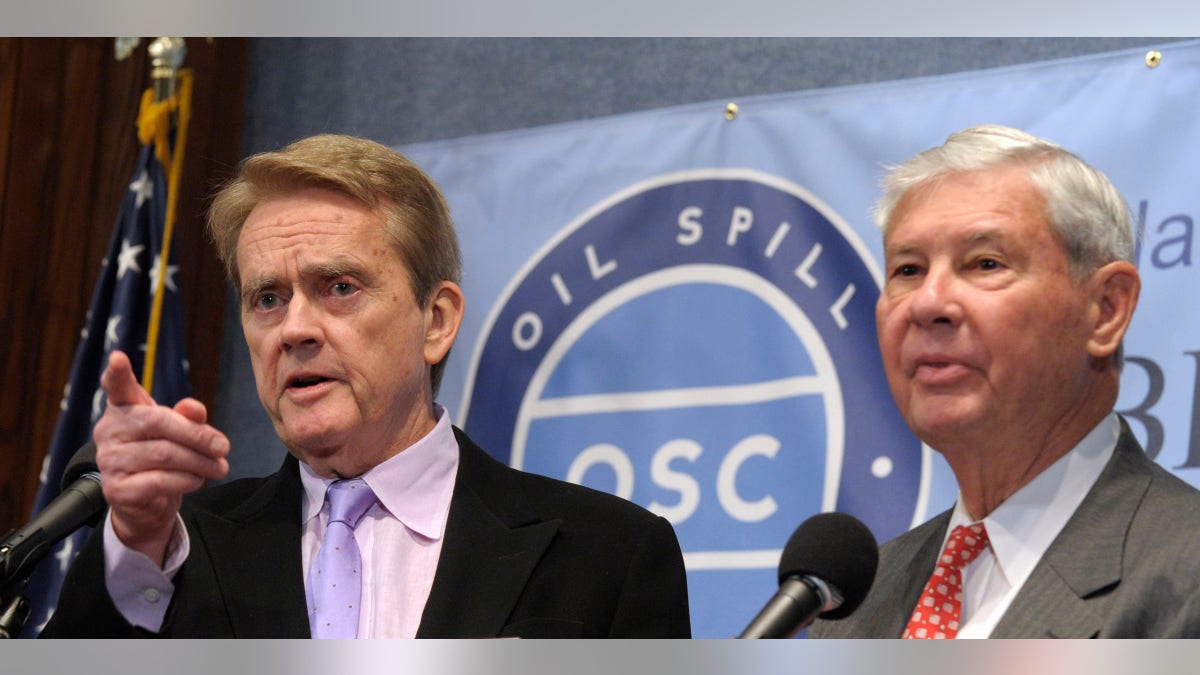
Jan. 11: National Oil Spill Commission Co-Chairmen, Bob Graham, right, and William Reilly, take part in a news conference at the National Press Club in Washington. (AP2011)
The oil industry, Congress and the Obama administration need to do more to reduce the chances of another large-scale oil spill, a presidential panel investigating the BP well blowout concluded Tuesday.
The seven-member panel unanimously endorsed 15 separate recommendations in the wake of the largest offshore oil spill in U.S. history. Many of the proposals will require action by Congress, but some could be done through rulemaking, primarily at the Interior Department, commissioners said.
When asked about the likelihood Congress would enact some of its suggestions, especially with a Republican majority in Congress looking to curb government regulation and spending, panel co-chair and former Florida Democratic Senator Bob Graham said that the magnitude of the disaster "would override an ideological preference for less government, less government intrusion, less government cost."
"What makes that level of optimism credible is the fact that members of Congress understand that this is not a typical example of government regulation of a private enterprise," Graham said, saying it was instead regulation of property owned by all Americans.
The panel calls for increasing budgets and training for the federal agency that regulates offshore drilling; boosting the liability cap for damages when companies drill offshore; dedicating 80 percent of fines and penalties from the BP spill to restoration of the Gulf; and lending more weight to scientific opinions by other federal scientists in decisions about drilling.
"It is our government's responsibility that exploration and extraction occur in ways that are beneficial to the country," Graham said. "Drilling offshore is a privilege to be earned, not a right to be exercised by private corporations."
If the recommendations are not carried out, "the probability of another failure will be dramatically greater," Graham said.
The panel said Congress should draft legislation to create within the Interior Department an independent safety agency and a separate environmental office to evaluate the risks of oil drilling to natural resources. Such a change would not require any additional funding.
U.S. regulations for offshore drilling should be at least as stringent as those in other oil-producing nations and require oil companies to adopt safety procedures common elsewhere but lacking in the Gulf, it said.
Kendra Barkoff, a spokeswoman for Interior Secretary Ken Salazar, said in a statement Monday that the department already has "undertaken an aggressive overhaul" to increase safety and ensure responsible oil and gas development. And President Barack Obama has already called on Congress to raise the liability cap for oil spills and to dedicate a portion of the water pollution fines to restoration.
"We have made significant progress over the last eight months, but these reforms must continue," Barkoff said.
The panel also called for an industry-led safety institute, similar to the one created by nuclear power producers after the 1979 Three Mile Island accident.
Calls to BP, Halliburton and Transocean for comment were not immediately returned. Last week, the commission said that management failures at the three companies led to the blowout and explosion that killed 11 workers and released more than 200 million gallons of oil from the damaged oil well.
Since then, the oil industry and government have taken numerous steps in an effort to improve safety since the BP blowout.
BP fired its executive responsible for deep-water wells like the one that blew out in the Gulf of Mexico in September. The company also created a new unit to police safety practices in all of BP's technical operations, while the federal government imposed new regulations and a moratorium on deep-water drilling. It later lifted the moratorium.
Additionally, Bureau of Ocean Energy Management Director Michael Bromwich established an internal affairs unit to expose improper relationships between companies and regulators. He has vowed to improve inspections, and required operators to show that they are prepared for a potential blowout and massive oil spill.
New drilling proposals also will have to undergo more thorough environmental reviews, and meet new safety standards that apply to all deep-water operations.




















